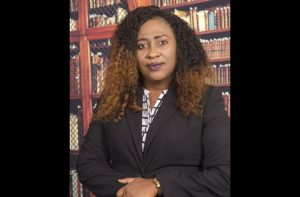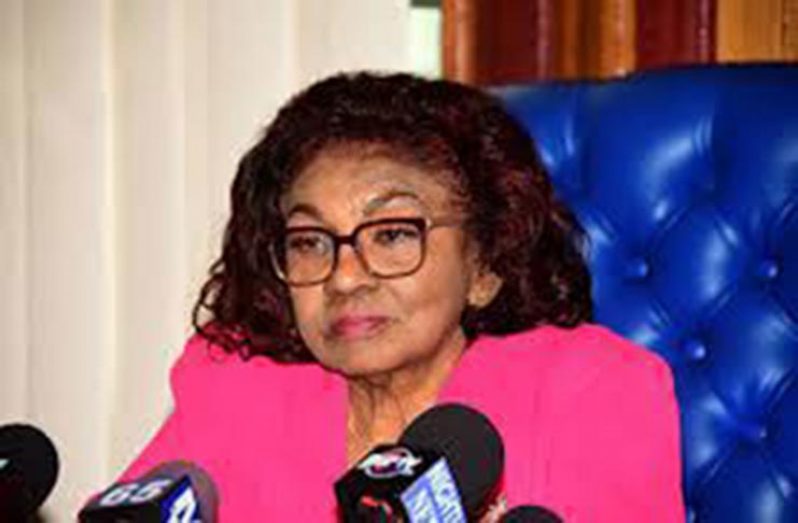…tells Appellate Court to strike out challenge to elections report, declaration
THROUGH her attorney, Kim Kyte-Thomas, the Chairman of the Guyana Elections Commission (GECOM), Justice (Ret’d) Claudette Singh, said the application filed challenging GECOM’s decision to compile an Elections Report without first determining the credibility of the General and Regional Elections should be struck out forthwith.
According to Justice Singh, the application is “misconceived.” In her written submissions to the Court of Appeal on Friday, Kyte-Thomas, on behalf of GECOM Chair, submitted that Article 177 (4) of the Constitution clothes the Appellate Court with a “narrow special exclusive” jurisdiction to hear and determine questions relative to the validity of an election of a president with particular reference to qualification and or the interpretation of the Constitution.
It was Article 177 (4) that the Appellant Eslyn David, through Attorney Mayo Robertson, relied upon to file the application but Kyte-Thomas submitted that the words “or the interpretation of the Constitution in Article 177 (4)” relate to the interpretation of the constitutional provisions in relation to any person for election to the presidency.

“The Court of Appeal is therefore not vested with original jurisdiction to hear questions on the interpretation of the Constitution outside of this narrow special jurisdiction. It is the High Court which is so vested,” Kyte-Thomas submitted to the Appellate Court.
The Legal Counsel further submitted that Article 133 (1) empowers the Court of Appeal to hear appeals from the High Court on questions on constitutional interpretation, and as such the first order sought by David seeking a declaration that GECOM failed to act in accordance with its Order (Order No. 60) do not touch and concern the qualification of a person elected President. The situation, she said, is the same in the case of the second order being sought, in which the Appellant is seeking an interpretation of the words “more votes are cast.”
“It is respectfully submitted that the application is misconceived and ought to be struck out forthwith,” Kyte-Thomas told the Court in her written submission.
She added: “Further when one reads the entire Article 177, the article contemplates a person already declared by GECOM as President. It is respectfully submitted that the electoral process has not reached this stage.”
David, a North Sophia, Georgetown voter, in her application, submitted that the Elections Commission had to determine a final credible count and or the credibility of the result of the General and Regional Elections held last March as required by Order 60 – the order that triggered the National Recount. But Kyte-Thomas submitted that such a relief could only be determined by the High Court via an Elections Petition.
“Article 163 (1) (b) of the Constitution confers on the High Court the exclusive jurisdiction to determine the validity of an election. In this regard, GECOM could not have thereby cloth itself with jurisdiction to establish itself as a Court of Law to determine credibility of an election when Article 163 (1) stipulates that the High Court shall have exclusive jurisdiction to determine the legality of an election,” the Legal Counsel submitted.
Iterating a position held by GECOM Chair, Kyte-Thomas said the Elections Commission cannot arrogate onto itself a jurisdiction to determine the credibility of an election or any unlawful act. No such power, she emphasized, was conferred upon GECOM under Article 162 (1) (b) of the Constitution, and as such, its hands are tied.
Referencing to the case Gladys Petrie v. Attorney General (1968), the Legal Counsel submitted that Articles 162 and 163 “clearly and sharply” separate the functions of GECOM and that of the High Court with respect to the electoral process.
Further, it was pointed out that the Parliament of Guyana made clear provision for the determination of the validity of elections by way of the National Assembly (Validity of Elections) Act, Chapter 1:04.
The title of that Act reads: – “An Act to provide for the determination of questions relating to the validity of elections of members of the National Assembly under a system of Proportional Representation.”
Section 3(1) of the Act provides, “Any question referred to Article 163(1) (a), (b) and (c) of the Constitution may, in respect of an election referred to in Article 60(2) of the Constitution and with a view of securing appropriate remedial orders, be referred to the court and shall thereupon be determined by it in accordance with this Act and every such reference shall be by petition (hereafter referred to as an election petition.”
Kyte-Thomas iterated that the Parliament gave exclusive jurisdiction to the High Court to determine lawfulness and validity of an election, and, as such, no subsidiary legislation can modify it.
“The Parliament of the Co-operative Republic of Guyana did not vest GECOM with those powers but instead vested that jurisdiction to the High Court under Article 163(1) (b),” the Legal Counsel iterated while noting that it is not the duty of the court to re-write the constitution but to clearly interpret it. Kyte-Thomas put to the Court that the case brought by David is simply premature and should not be entertained.
“If GECOM is to embark on this credibility exercise what basis should be used to determine the issues of validity and credibility? The letters from one party? The opinion of the CEO? Can GECOM just use the CEO’s opinion without giving interested parties an opportunity to be heard? Is GECOM to hold court and take evidence? The Applicant is asking GECOM to embark on a trial,” Kyte-Thomas reasoned.
She added: “The court should not be asked to act in vain. Even if the court grants the orders sought, what is the next position? Can this court direct GECOM what to decide? Can this court order GECOM to hold a fresh election? Are these orders even sought? The short answer is no since this is not an election court.”
THE RIGHT TO APPLY
But while the GECOM Chair, through her Attorney, called for the dismissal of the case, David, through her Attorney Mayo Robertson, said her application was properly placed before the Court under Article 177 (4) of the Constitution.
“Just as the Privy Council in Jaundoo was unable to find anything in the Rules of the Guyanese High Court or in law to prevent the plaintiff from bringing her action, there is equally no legal barrier to prevent the instant Applicant from bringing her 5 motions against the Respondents so as to have the Court of Appeal grant the relief sought therein,” Robertson submitted.
Article 177 (2), he submitted, confers on the Appellate Court a unique, exclusive and original jurisdiction to not only hear questions relative to the validity of an election of a President but also the interpretation of the Constitution.
It was on that basis, he said, Court was asked to interpret Article 177 (2) of the Constitution, in particular, the words “if more votes are cast.”


.jpg)











